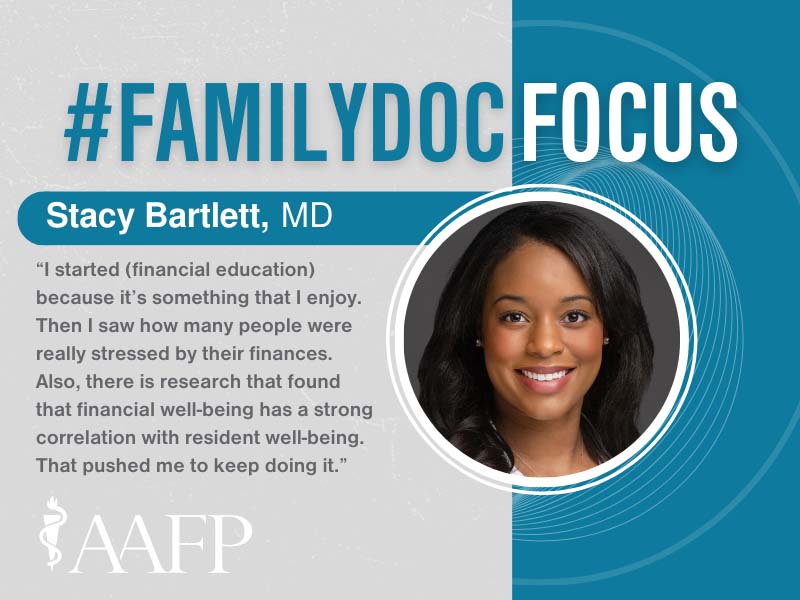Speaker Aims to Help Students, Residents Set Firm Financial Foundation
June 27, 2024, David Mitchell — Stacy Bartlett, M.D., didn’t need board games like Monopoly or The Game of Life to learn about money as a kid. She was playing, and learning, with real money.

After bombarding her parents with questions about money and finance, her father gave Bartlett her first stock and encouraged her to follow their hometown hamburger chain’s progress in the newspaper.
“Wendy’s is based in Columbus, which is where we’re from,” said Bartlett, an assistant professor of family medicine at the University of Pittsburgh School of Medicine and faculty at Shadyside Family Medicine Residency. “I was 10, and I loved Frosties — I mean, I still love Frosties — so that was an obvious choice for me. My parents were good with their money and wanted me to be prepared to handle money appropriately. To me, it was like a game that had consequences. You can do better or worse, so I was going to learn how to do it well. I have been a finance nerd my whole life.”
Bartlett, a certified financial education instructor, will share her passion in a session focused on financial literacy during the National Conference of Family Medicine Residency and Medical Students, Aug. 1-3 in Kansas City, Mo.
Her presentation is based on a module she created for the Family Medicine Champions program and offers “financial steps you can take for your future, setting things up in a tangible way,” she said. “I’m hoping that students and residents come away feeling less stressed about their finances. Hopefully, they can pick one or two things they are going to do to set a foundation to put themselves in a good financial spot.”
Bartlett said her friends took note of her financial acumen in college and medical school, and she started offering informal consultations.
“I started this because it’s something that I enjoy,” she said. “Then I saw how many people were really stressed by their finances. Also, there is research that found that financial well-being has a strong correlation with resident well-being. That pushed me to keep doing it.”
During a 2021-22 fellowship in academic medicine faculty development at the University of Pittsburgh School of Medicine, Bartlett formalized her curriculum.
“I had the content, and I was always developing, reading, listening and trying to learn and improve it,” she said. “When I got to fellowship, I was able to make it a more robust curriculum. Getting my (financial education instructor) certificate brought everything together.”
Bartlett, who was a scholar in the AAFP’s Leading Physician Well-being certificate program in 2021, said some people don’t realize how much financial well-being influences other aspects of well-being.
“They’re super connected,” she said. “One way is the cognitive and emotional load that feeling stressed about your finances can take. There’s already enough to be stressed about in medical school and residency. Another issue is that some people think they have to choose a really high-paying specialty because of student loans. That’s not the case. You can do what is going to bring you more joy potentially. You don’t have to choose the thing that’s going to pay you the most.”
Bartlett entered Brown University’s Warren Alpert Medical School with plans to be a surgeon.
“I had some experiences in college shadowing and working in labs with surgeons,” she said. “I quickly realized that talking to people was better. What I wanted to do was form connections with people, so I was pretty sure I wanted to do primary care. I want people to trust me, so having longitudinal relationships is huge. I wanted to have a breadth of experience and knowledge to be a go-to physician for patients.
“My favorite thing is seeing families together. I love doing maternal-child health and seeing moms and dads with their kids. Family medicine is the only place to do that. I also love that I get to do a little bit of inpatient. I do outpatient. I teach and do research. I do all those things, and I think the best way to do that is in family medicine.”